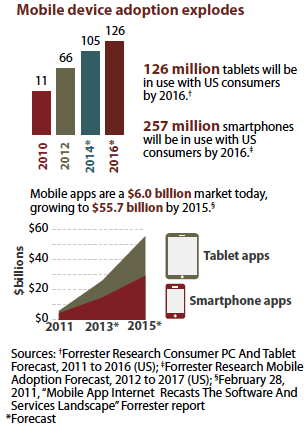
submitted by Samuel Bendett
by Zack Whittaker - zdnet.com - February 13, 2012
Summary: A new Forrester research report sees over 1 billion smartphones being used by 2016, while app store spending increases and ‘bring your own’ device becomes the norm.
In a world where already you cannot travel on the subway without someone flipping out their cellphone, or stand at a Starbucks without someone yapping away on their iPhone, imagine what’ll happen with 1 billion smartphones out there?
Forrester seems to think so. Analysts at Forrester believe that by 2016 — only four years away, and in time for the following Olympics — there could be as many as 1 billion smartphones on the planet. This isn’t to say that everyone will have two or more smartphones, that is.
(READ COMPLETE ARTICLE)
Problem, Solution, SitRep, or ?:
Recent Comments